Every month, we pick a few topics for exploration. The topics we select aren’t meant to cover every issue area facing the progressive community, but rather to give actionable advice on how to talk about key issue areas. In this volume we focus on race relations and racial violence in the age of Trump.
Americans see a rising tide of racism in the United States, but perceptions of race and racism remain complicated and often contradictory.
While there is no straightforward way to navigate these complex issues, progressives can connect with Americans across the political spectrum by making a values-based appeal against President Trump’s racist rhetoric.
Americans are worried about rising violence and racism – but also worried about the overuse of “racist.”
From Charlottesville to El Paso, recent years have seen a series of violent incidents inspired by racist rhetoric and demonstrations by racist groups. In turn, the majority of Americans say they’re worried about “white supremacist terrorism” (66%) and “white nationalist terrorism” (65%) – at levels approaching “foreign terrorism” (77%). “Homegrown terrorism” causes even more concern, at 83%.
However, American public opinion on racism is incredibly complex. While a majority (55%) believe it has become “more common” for people to express racist opinions and ideas over recent years – and this holds up across racial and ethnic lines (62% of African-Americans, 58% of Hispanics, and 53% of whites) – Americans also believe the term “racist” is used too freely. Sixty-four percent of Americans say that people are too quick to use the label “racist,” including 70% of whites and even 52% among African-Americans. For other labels such as “white nationalist” and “white supremacist,” the share who view the term as over-used is much lower, but still much greater than the share who think people are too reluctant.
Expression of racism seen as “more common.”
Overall, most Americans believe racist opinions and ideas are expressed more commonly today than in years past. As with so many other issues, this perception still appears to be filtered through the lens of partisanship. In fact, even on a topic directly related to racial and ethnic identity, party affiliation is the bolder dividing line.
While white Americans perceive racism as more common, they believe “racist” is a term used too quickly.
Overall, 64% of Americans say people in politics and media are too quick to use the term “racist,” but there are large differences by partisanship – even larger than the differences between racial and ethnic groups. Looking among white Americans only, independents who lean toward neither party (75% “too quick to use”) are more similar to Republicans (85%) than they are to Democrats (47%) on this issue.
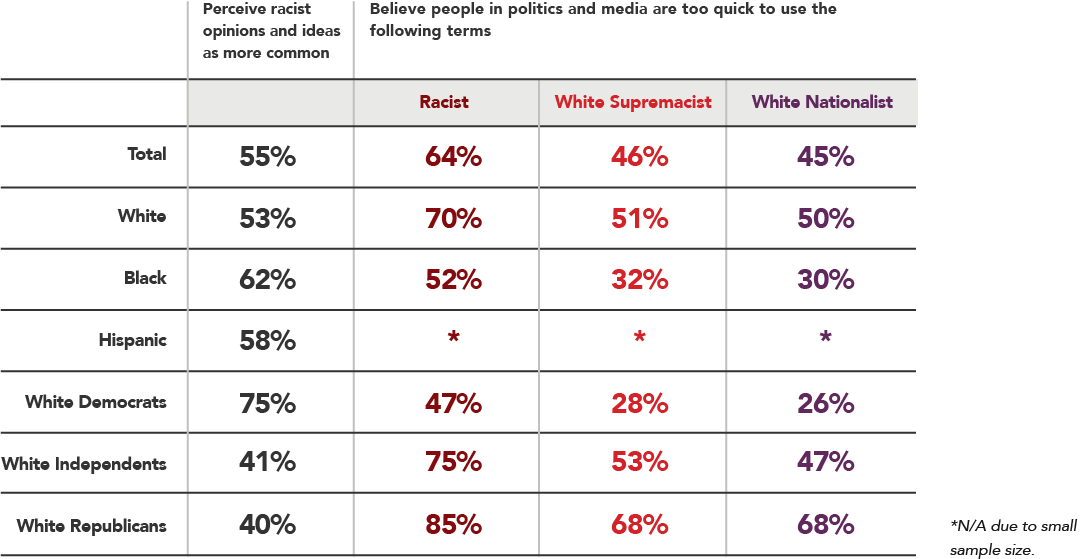
Racial resentment offers another lens for examining public opinion around Donald Trump and race.
Measuring public sentiment around issues of race and racism has never been easy. But political scientists decades ago developed a method to measure what they call “racial resentment.” Respondents are asked if they agree or disagree with a series of four statements about the history and experiences of black Americans, such as “It’s really a matter of some people not trying hard enough; if blacks would only try harder they could be just as well off as whites.” Responses to each question are combined for each respondent to give them a single rating on the “racial resentment” scale.
The scale is typically used to gauge the impact of racial prejudice among whites on other matters of public policy and politics. It can even reveal differences among Americans that transcend partisanship – for example, helping to illustrate what sets Republican supporters of the president who are turned off by some of his racial appeals from those who respond positively to those appeals.
Views on race transcend partisanship around Donald Trump.
Racial resentment adds another layer to partisanship and Trump’s approval rating. Overall, Americans are highly polarized about Donald Trump, even when looking at whites alone: just 7% of Democrats approve, compared to 36% of independents and 86% of Republicans. But divide each of these groups between those with high racial resentment (here, “high resentment” means scoring above average on the scale) from those low on the scale and you still get further differences, showing how race can be a dividing line even with those of the same political party and leanings.
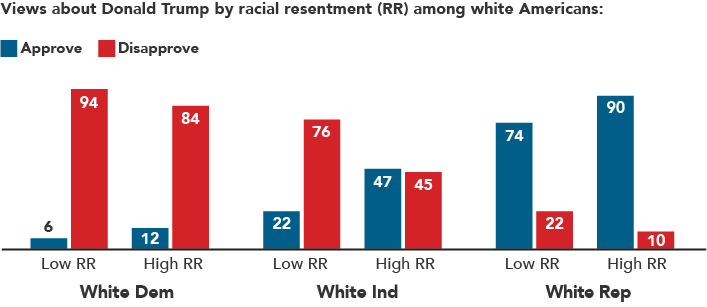
Americans largely don’t trust the president when it comes to dealing with racism.
One reason why support for Donald Trump may be highly correlated with racial attitudes is the president’s words and actions around racism and culture have made it a deeply polarizing issue for him personally. Asked whether they trust Democrats in Congress or Trump on “dealing with racism,” Americans overwhelmingly side with Democrats – the 24-point (54% to 30%) gap on this issue is even wider than the president’s deficit on health care, long one of his weakest issues. On this issue, Democrats are preferred both among whites with a college degree (48% to 34%) and those without (45% to 38%).
However, the public assessment of Trump’s handling of race contrasts with the assessment of his handling of “American culture” – a reminder that perceptions of race and American culture are not always aligned. In contrast to “dealing with racism,” there is a pronounced difference between whites with a college degree versus those without. White college- educated Americans are evenly split between trusting Democrats in Congress and President Trump (42% to 41%) on “protecting American culture”, while whites without a college degree trust President Trump by a 15-point margin (32% to 47%).
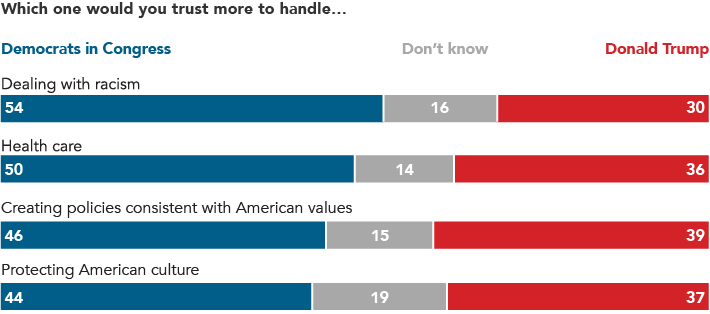
It is effective to argue that Trump’s words and actions go against American values.
In this survey, respondents were exposed to four distinct messages making the case that Trump has handled these issues poorly, and asked to compare the messages to a typical Trump defense arguing he is not racist and his policies have helped communities of color. Overall, each of the anti-Trump arguments is viewed as “more convincing” than the Trump argument, but the gap is notably narrower than the 16-point gap in views about Trump in general (41% approve, 57% disapprove across the whole sample).
However, when looking at a subset of Americans who are less partisan and arguably more movable when it comes to Donald Trump – including independents, as well as a mix of Democrats who approve of Trump and Republicans who disapprove – one message focusing on “American values” is relatively more effective.
Most agree Trump is “racist.”
Fifty-five percent of Americans say the word “racist” applies to Donald Trump, while 42% say it does not. The numbers line up almost exactly with his approval rating in the same poll, and the same is true among white Americans, who say he is racist by 50%-48% and are split on approval, 49%-49%. While Americans believe Trump is a racist, they also believe that the term is too easily applied, including 70% of white Americans who believe people are too quick to use this word.
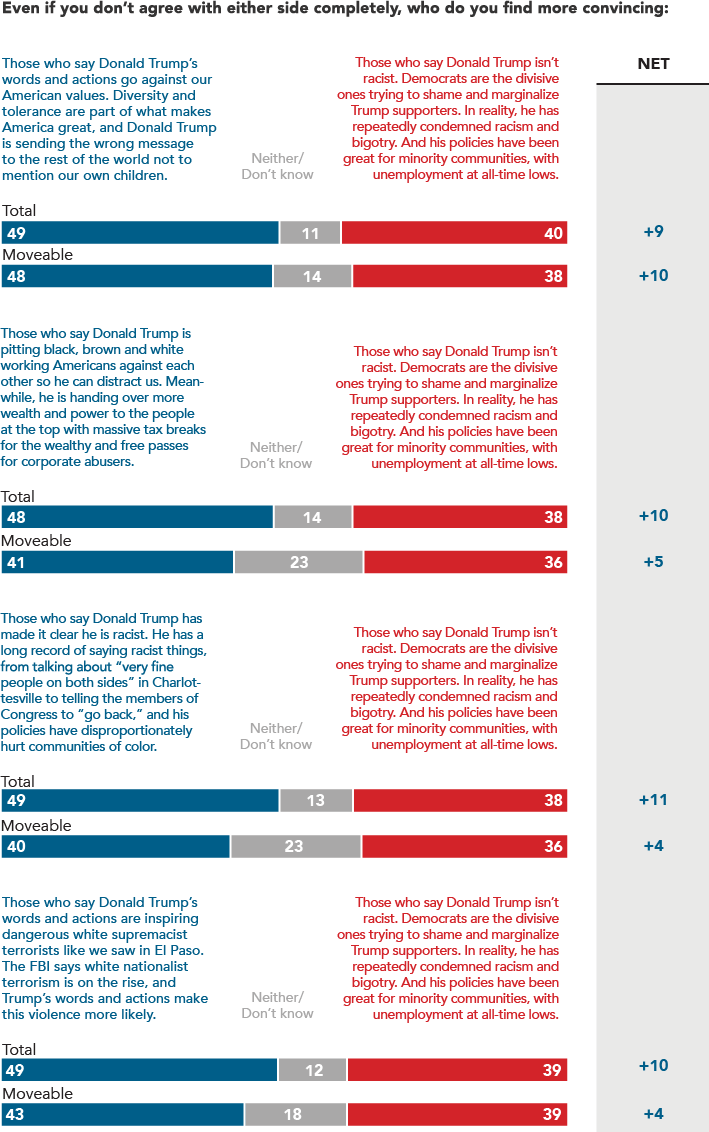
Americans are very troubled by many of Trump’s policies – but it’s his words that tend to be cited as the most obvious examples of his prejudice.
The examples of President Trump using racist attacks against his perceived enemies are myriad. These attacks are often verbal, but his favored policies – from the wall to the “Muslim ban” – also frequently hurt groups with particular ethnic or racial backgrounds more than others. This edition of Navigator finds that even when policies disproportionately impact certain groups and are deeply upsetting for many Americans, some are hesitant – or even unwilling – to make the connection to “racism.” However, Trump’s explicit, racially-focused remarks stir up general concern while also providing clear examples for advocates to build the case that Trump is acting out of prejudice.
For example, while Trump “approving the family separation policy for immigrant children and their parents” is deeply troubling for a wide swathe of the public (54% find it very troubling), fewer (44%) say it is “evidence that Trump is racist.” Thirty-seven percent say calling this racist would instead be an “overreaction” (respondents were split into two groups, so those who were asked if the issue was troubling were not asked if it was an example of racism, and vice versa). By contrast, “Telling four Democratic congresswomen of color to go back to where they came from” is both troubling and perceived as racist by the same measure (55%).
However, Americans are not reluctant to think these examples reflect what is in Trump’s heart. Asked the main reasons he says and does the things listed in the chart below, 66% say “these are his true beliefs and he doesn’t filter what he says.” Just 34% say “he thinks it helps him politically” and 30% say “he just likes to get a rise out of people.”
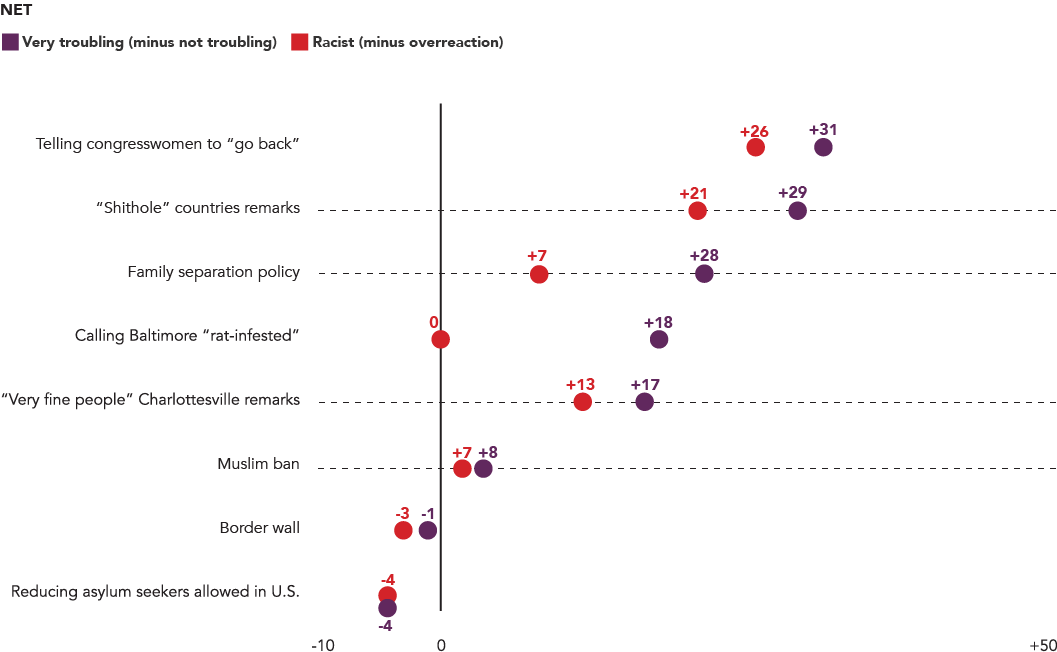
About The Study
Global Strategy Group conducted a public opinion survey among a sample of 1,500 registered voters conducted September 11-16, 2019. The survey was conducted online, recruiting respondents from multiple opt-in online panel vendors. Respondents were verified against a voter file and special care was taken to ensure the demographic composition of our sample matched that of the national registered voter population across a variety of demographic variables.

